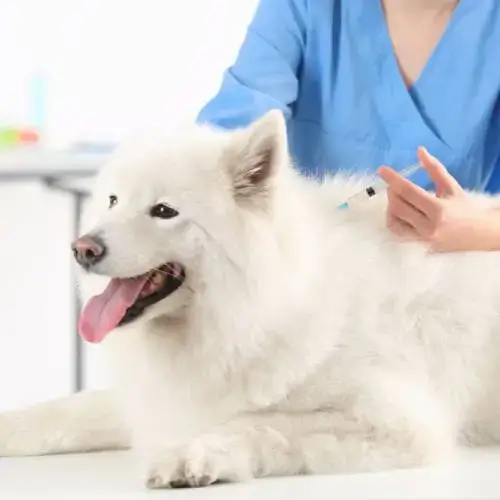Home / Compare Pet Insurance / Common dog diseases and…

Key takeaways
This guide covers the most common dog diseases and illnesses pet owners should know about and provides tips for ensuring your canine companion lives a long and healthy life. Here’s what you need to know:
- Most dog diseases can be treated with medication, surgery or specialised treatment. Some illnesses may be chronic or irreversible.
- Proper immunisation can prevent infectious or dangerous diseases.
- Pet insurance can cover a portion of eligible vet costs if your dog develops a health condition or disease. Most policies combine cover for accidental injuries and illnesses, while some only cover accidents.
- Pet insurance doesn’t cover pre-existing conditions or vaccine-preventable diseases.
- Insuring your dog from a young age means you can keep the same cover throughout their life with fewer exclusions for health problems.
Expert tips on choosing the right pet insurance
Our resident pet insurance expert, Adrian Taylor, has helpful tips on how to find suitable pet insurance to cover treatment costs if your dog is sick or hurt.

Choose a comprehensive cover
It’s always worth opting for a comprehensive policy that covers a long list of dog illnesses and conditions. Be sure to choose pet insurance that will cover accidental injuries and a wider range of specified illnesses like cataracts, conjunctivitis, ear and skin infections, arthritis, gastroenteritis, heart disease, cancer and more. Some policies may even cover prescribed medication and diagnostic testing.
Consider a routine care add-on
Routine care cover is an optional extra that helps cover the costs of vaccinations and other preventative care expenses like periodic check-ups, worming, dental treatment and specialised therapies. Some policies even offer benefits for grooming and behavioural therapy. Keep in mind that optional extras come at an additional cost, though.
Insure your pet before they develop pre-existing conditions
Pet insurance doesn’t typically cover pre-existing conditions which is why it’s advised to insure your pet(s) when they’re young and healthy, before they develop symptoms of an ailment. A pre-existing condition is an illness or sickness developed before taking out your policy or within the applicable waiting period. Bilateral or conditions related to a pre-existing condition and vaccine-preventable diseases are also typically excluded from coverage.
Common dog diseases and how to prevent them
1. Heartworm

Transmitted by mosquitos, heartworms are long, parasitic worms that grow inside a dog’s heart and lungs – eventually causing organ failure and death. Symptoms of heartworm include coughing, wheezing, lethargy and weight loss. Jaundice may also be present in cases where the spleen or liver is affected. Some infected animals may require ongoing or lifelong treatment to prevent heart failure. Treatment for heartworm in dogs can be dangerous and costly, so prevention is paramount.1
Prevention: Get your dog an annual heartworm vaccination from the vet or a monthly medication like an oral tablet or chews. The cheaper option will depend on whether your vet charges a consultation fee and the medication brand you use. In addition to medication, it’s wise to keep your dog away from mosquito-infested areas, such as swamps, wetlands and stagnant water.
2. Fleas and ticks
Fleas are external parasites, living in the dog’s coat and feeding on their blood. Flea bites are irritating and painful for dogs, and they can cause skin conditions, anaemia and infections. Symptoms include scratching, biting and hair loss around the affected area. Treatment for fleas is reasonably priced and available as a shampoo or tablets.
Ticks are much more serious than fleas and can cause blood poisoning, Lyme disease and, in some cases, death. Symptoms include paralysis of the hind legs, lameness, a change in the dog’s bark and vomiting. Treatment ranges from tablets or chews to topical treatments, available from your local pet store or vet.2
Prevention: For fleas, you can use tablets, flea collars and regular bathing and grooming to minimise the risk of infestation. For ticks, there are topical treatments, sprays and tick collars available. It’s also helpful to complete daily checks by running your fingertips or a fine comb through your dog’s coat.
3. Cancer
Just like humans, dogs can get cancer. Common types include lymphoma, melanomas in the dog’s mouth, osteosarcoma (bone cancer) and mast cell skin tumours. Cancer symptoms in dogs include lethargy, loss of appetite and weight loss. Dog cancer is treated with surgery, chemotherapy and radiation – which can cost thousands of dollars. That said, it’s worth noting that some cancer growths are benign and not life-threatening.
Prevention: Like all cancers, catching the symptoms early is important. Watch for unusual lumps and spots on your dog’s mouth, face and body. Also, monitor any changes in appetite or energy.
4. Diabetes
Another chronic disease dogs can get is diabetes, which is caused by either insulin resistance or insulin deficiency. Insulin is a vital hormone that controls how cells and tissues absorb energy and the breakdown of fats and proteins. If a dog doesn’t produce insulin or their body doesn’t metabolise insulin, it may lead to elevated blood sugar levels and result in hyperglycaemia which, if left untreated, can cause many complicated health problems like organ failure. Chronic pancreatitis (pancreas inflammation) can also lead to your dog becoming diabetic.3
Prevention: Feeding your furry companion a balanced diet and ensuring enough exercise for their size and breed could help prevent dog diabetes. However, it’s important to note that diabetes isn’t always preventable because age, genetics and other health conditions can be contributing factors.
5. Kennel cough
Kennel cough is a form of bronchitis that causes inflammation in the dog’s windpipe. In human terms, it’s the equivalent of the common cold. Dogs typically pick up kennel cough from cold temperatures, poorly ventilated environments and other infected dogs.
You can spot kennel cough when your dog sounds like they’re choking. Sneezing, coughing, a runny nose and difficulty breathing are common symptoms. Typical treatments include rest, good food and access to plenty of water. Antibiotics are often needed in severe cases.4
Prevention: A highly contagious illness, you can get your dog vaccinated against kennel cough. Also, try and keep your dog away from large groups of dogs or dogs unknown to you.
6. Canine influenza
Canine influenza (also known as dog flu) is caused by an influenza A virus known to infect dogs. It’s similar to the viral strains that cause the flu in humans. Dog flu is highly contagious and spreads through direct contact with infected dogs, or respiratory secretions through barking, coughing or sneezing. It can also spread through contaminated objects (e.g. water bowls, leashes) and contact with people who’ve been exposed to dogs with the viral infection. Typical symptoms of mild dog flu may be similar to kennel cough and include a cough, a runny rose, fever, eye discharge and fever.5
Prevention: Vaccination is available for both strains of canine influenza − H3N8 and H3N2. Immunisation doesn’t always prevent infection, but it may reduce the severity and duration of the illness.
7. Dog arthritis
Arthritis or osteoarthritis is prevalent among older dogs. If your dog has arthritis, you’ll notice they’re slow to get back up on their feet and less active than they once were. The use of exercise, weight control and medication can ease your beloved dog’s pain. Hip dysplasia (osteoarthritis of the hip) is also common in dogs and especially in large breeds like bulldogs, golden retrievers, Great Danes, Labradors, mastiffs, pugs, Rottweilers and St. Bernards.6
Prevention: You can reduce the chances of dog arthritis through a quality diet, comfortable bedding, weight control, supplementation and deterrence from laying on hard surfaces, such as concrete and floorboards. On the other hand, hip dysplasia is often hereditary but can be alleviated with proper care. Your vet should be able to advise on the best course of action.
8. Skin conditions
Dogs can get contact allergies (contact dermatitis), typically after direct contact with an allergen like certain types of grass or chemicals found in flea prevention collars or products like pyrethrin. Canines can also be prone to skin infections ranging from mild yeast infections and impetigo to alopecia and ringworm. Some dog breeds have a predisposition to skin conditions, such as bulldogs and Shar-Peis. Parasitic mites like scabies and mange are also not uncommon in dogs; you can reduce this risk by keeping your pooch away from wild animals.7
Prevention: You can protect your dog’s skin barrier with regular bathing (use medicated shampoos if needed) and proper parasite control to keep external parasites like fleas and mites at bay. Some skin conditions in dogs are incurable but manageable.
9. Intestinal issues
All dogs can have tummy troubles, but bloat and intestine issues are more common in deep-chested, large breeds like Labradors, Basset Hounds, Irish Setters, German Shepherds and Great Danes, to name a few. Therefore, some of these dog breeds may be more expensive to insure. Symptoms of dog bloat include abdominal pain or distention and dry heaving. It’s important to keep an eye out for any behavioural change in your dog, like if they position themselves in a downward facing pose or if they’re covering their belly in pain. Dogs can also get intestinal parasites like hookworms and roundworms, which can cause symptoms like vomiting, diarrhoea and anaemia.8
Prevention: Stomach and intestines disorders may not always be preventable as some breeds are predisposed to them. However, you can always help improve their digestion by ensuring they eat smaller meals throughout the day (rather than one big meal), drink plenty of water and exercise before and after meals to help move food along the digestive tract.
10. Urinary tract infections
Urinary tract infections (UTIs) are relatively common in dogs, especially in females. UTIs are caused by bacteria in the urinary tract (this can happen when faeces or debris enter the urethral opening) or if your dog’s immune system is weakened. Infections can be isolated events or recurring if your dog has an underlying health condition like diabetes, kidney disease or tumours in the urinary tract. The most common tell-tale signs of a urinary tract infection are frequent and often painful urination.9
Prevention: You can help prevent UTIs in dogs with a balanced diet that includes supplements and access to clean drinking water to flush away bacteria in the urinary tract. Regular grooming and bathing of the rear end can also help prevent bacteria from entering the urinary system.
Other dog ailments
Dogs can also be prone to other ailments and injuries, including but not limited to:
- Infectious/viral diseases. Some common infectious diseases are canine parvovirus (acute gastrointestinal illness), leptospirosis (bacterial infection), Bordetella (a respiratory disease) and canine distemper, which affects the respiratory, gastrointestinal and nervous system. Dogs contract these diseases through contact with an infected dog’s urine or faeces. Luckily, there are vaccines to protect your dog.
- Cruciate ligament injuries. Dogs are susceptible to tears or sprains of their cruciate ligaments, which stabilise the knees). Cruciate ligament conditions are a common health issue among dogs, especially larger breeds.
- Dog ear infections. When dirt, dust or an object gets lodged inside the dog’s ear canal, it can lead to an infection. This infection is often remedied with antibiotic ear drops from the vet.
- Diarrhoea. Sometimes diarrhoea is a sign of bad food or a minor allergic reaction; other times, it’s a sign of something more sinister. Contact your vet if symptoms persist.
- Dog cataracts. Dog breeds with the highest cataract prevalence include terriers and miniature poodles. If left untreated, a cataract can leave your dog blind. A dog cataract can only be removed surgically.
- Broken bones. If your dog is in an accident or falls from a height, they may have broken a bone. Your brave companion will try and hide the pain, so look out for limping or protruding lumps.
- Obesity. Overweight dogs are more likely to develop heart disease, kidney disease, arthritis and other debilitating illnesses. To avoid dog obesity, ensure your dog is exercised daily and fed a maximum of only twice per day.
Read more about dog care and disease prevention.
Pet insurance can cover some costs

Pet insurance can help to cover some of your pet’s critical healthcare costs due to injury or illness.
There are three main levels of pet insurance for dogs:
- Accident-only cover. This is the most basic level of cover you can get for your pet. It can help pay for some of the treatment costs if your pet is injured in an accident.
- Accident and illness cover. This can reimburse you for some of the treatment costs if your pet is injured in an accident or falls ill.
- Comprehensive/optional cover. Some insurers will allow you to add one or more optional covers to your pet insurance to pay for a portion of expenses relating to your pet’s routine care, such as check-ups, dental care or even behavioural training. This type of cover will come with an extra premium.
However, a pet insurance policy will likely cover only some of your pet care expenses. Check your policy’s Product Disclosure Statement (PDS) so you know what’s covered, what your policy excess is and what the exclusions are and your insurer’s Target Market Determination to check that the policy is suitable for you.
Important to know
What vaccines do dogs need?

In Australia, there are core and non-core vaccines. The core vaccines for dogs are to protect them against (potentially fatal) infectious diseases like canine parvovirus, distemper and hepatitis viruses. These are combined within a single vaccine, commonly known as the ‘C3’ vaccine.
When your dog is a puppy, their immune system is still developing. Therefore, it’s important to get them vaccinated as soon as possible. The first core vaccine should be given at 6 or 8 weeks, followed by a booster vaccine every 2 to 4 weeks until they reach 16 weeks of age.
Non-core vaccines for kennel cough and heartworm will incur additional costs. Consult your local vet on a vaccination schedule for your furry friend.
Is blood work necessary for dogs?
Your vet may recommend a blood test as part of your annual check-up, especially if your pet seems unwell or is getting on in years. Blood screening will become more important as your pet ages, as they tend to develop more health issues in their older years (similar to humans) or before starting any medications or treatment options. Vets will generally ask for a blood test if your dog needs surgery under anaesthetic to ensure they have a complete picture of your pup’s health and predispositions.
Meet our pet insurance expert, Adrian Taylor
As a General Insurance expert with over 13 years’ experience in financial services, Adrian Taylor knows that dogs and cats get themselves into all sorts of mischief. One part of Adrian’s work is to help empower consumers to understand how pet insurance can help save them from exorbitant vet bills when their pet gets injured or falls ill.
Want to know more about pet insurance?
1 Greencross Vets – Heartworm disease in pets. Accessed June 2023.
2 RSPCA Victoria − Flea and tick prevention. Accessed June 2023.
3 PetMD (Fetch) – 10 symptoms of diabetes in dogs. Accessed June 2023.
4 Greencross Vets – Canine (kennel) cough in dogs. Accessed June 2023.
5 VCA Animal Hospitals – Canine influenza: the dog flu. Accessed June 2023.
6 Greencross Vets − Hip dysplasia in dogs. Accessed June 2023.
7 PetMD − Skin problems in dogs. Accessed June 2023.
8 PetMD − Bloat in dogs. Accessed June 2023.
9 VCA Animal Hospitals − Urinary tract infections (UTIs) in dogs. Accessed June 2023.
10 RSPCA Knowledge Base – What vaccinations should my dog receive? Accessed June 2023.


